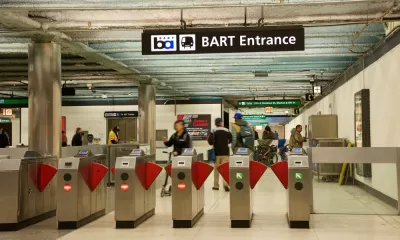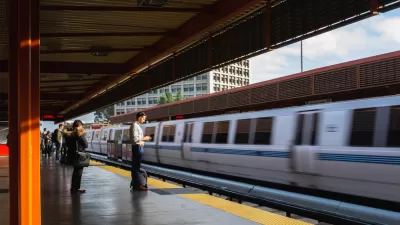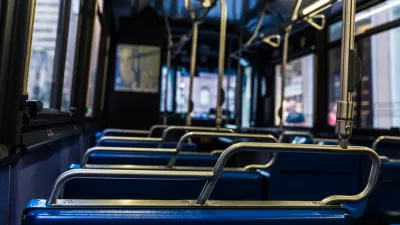California state political leaders last night struck a deal to keep the state’s transit systems afloat as ridership continues to recover and federal pandemic stimulus money runs dry.

“California’s state budget will include a subsidy for BART, SFMTA and Bay Area transit agencies that could delay service cuts agencies warned would happen as early as fall as they approach massive financial deficits,” reports Ricardo Cano in a paywalled article for the San Francisco Chronicle.
“The budget deal struck by Gov. Gavin Newsom and Democratic legislative leaders Sunday night nixes $2 billion in cuts to transit capital projects that the governor proposed in January. Transit agencies will be able to ‘flex’ these preserved capital funds to pay for service costs,” according to the article.
The budget breakthrough came just a few days after S&P Global Ratings dropped the Bay Area Rapid Transit District’s credit two levels, to A+.
In addition to the flex funding for operations, California transit systems will receive $1.1 billion in state cap-and-trade program funding. Together, the funding is enough to delay a fiscal cliff that leaders at BART and Muni had predicted would arrive in 2025. Deep service cuts, however, could have started to take effect as early as this fall, according to Cano, who also reported in detail on the risks facing California transit systems in March 2023.
California is far from alone in needing to find long-term solutions to the transit funding gap—Washington, D.C.’s Metro has been threatened with a lower credit rating, for example, and New York City's transit systems are pinning their hopes for a long-term finding solution on a long-delayed and controversial congestion pricing scheme that would charge drivers to enter a large section of Manhattan.
FULL STORY: California budget deal will include a $1.1 billion bailout for BART, Bay Area transit

Planetizen Federal Action Tracker
A weekly monitor of how Trump’s orders and actions are impacting planners and planning in America.

Congressman Proposes Bill to Rename DC Metro “Trump Train”
The Make Autorail Great Again Act would withhold federal funding to the system until the Washington Metropolitan Area Transit Authority (WMATA), rebrands as the Washington Metropolitan Authority for Greater Access (WMAGA).

The Simple Legislative Tool Transforming Vacant Downtowns
In California, Michigan and Georgia, an easy win is bringing dollars — and delight — back to city centers.

The States Losing Rural Delivery Rooms at an Alarming Pace
In some states, as few as 9% of rural hospitals still deliver babies. As a result, rising pre-term births, no adequate pre-term care and "harrowing" close calls are a growing reality.

The Small South Asian Republic Going all in on EVs
Thanks to one simple policy change less than five years ago, 65% of new cars in this Himalayan country are now electric.

DC Backpedals on Bike Lane Protection, Swaps Barriers for Paint
Citing aesthetic concerns, the city is removing the concrete barriers and flexposts that once separated Arizona Avenue cyclists from motor vehicles.
Urban Design for Planners 1: Software Tools
This six-course series explores essential urban design concepts using open source software and equips planners with the tools they need to participate fully in the urban design process.
Planning for Universal Design
Learn the tools for implementing Universal Design in planning regulations.
Smith Gee Studio
City of Charlotte
City of Camden Redevelopment Agency
City of Astoria
Transportation Research & Education Center (TREC) at Portland State University
US High Speed Rail Association
City of Camden Redevelopment Agency
Municipality of Princeton (NJ)





























